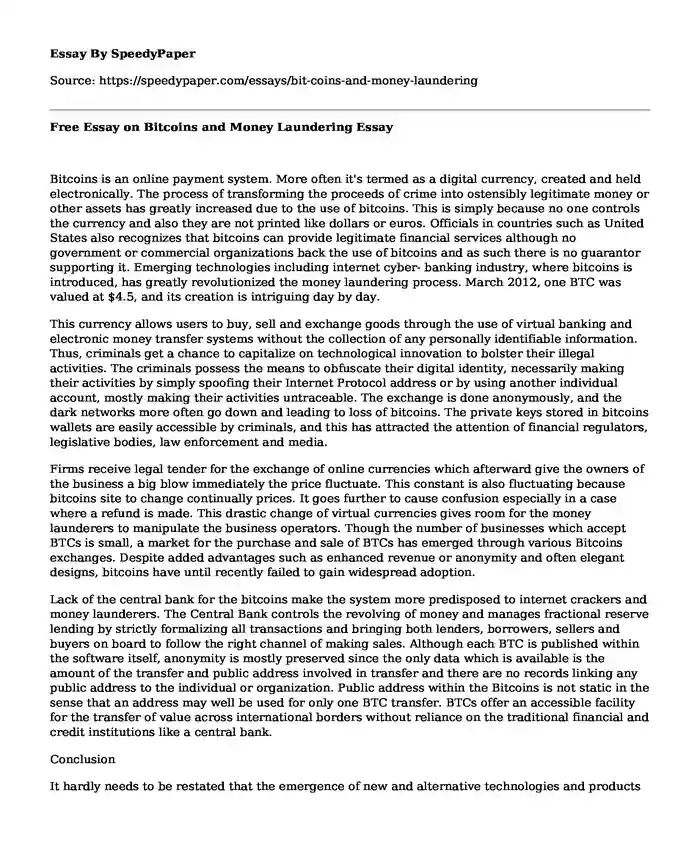Bitcoins is an online payment system. More often it's termed as a digital currency, created and held electronically. The process of transforming the proceeds of crime into ostensibly legitimate money or other assets has greatly increased due to the use of bitcoins. This is simply because no one controls the currency and also they are not printed like dollars or euros. Officials in countries such as United States also recognizes that bitcoins can provide legitimate financial services although no government or commercial organizations back the use of bitcoins and as such there is no guarantor supporting it. Emerging technologies including internet cyber- banking industry, where bitcoins is introduced, has greatly revolutionized the money laundering process. March 2012, one BTC was valued at $4.5, and its creation is intriguing day by day.
This currency allows users to buy, sell and exchange goods through the use of virtual banking and electronic money transfer systems without the collection of any personally identifiable information. Thus, criminals get a chance to capitalize on technological innovation to bolster their illegal activities. The criminals possess the means to obfuscate their digital identity, necessarily making their activities by simply spoofing their Internet Protocol address or by using another individual account, mostly making their activities untraceable. The exchange is done anonymously, and the dark networks more often go down and leading to loss of bitcoins. The private keys stored in bitcoins wallets are easily accessible by criminals, and this has attracted the attention of financial regulators, legislative bodies, law enforcement and media.
Firms receive legal tender for the exchange of online currencies which afterward give the owners of the business a big blow immediately the price fluctuate. This constant is also fluctuating because bitcoins site to change continually prices. It goes further to cause confusion especially in a case where a refund is made. This drastic change of virtual currencies gives room for the money launderers to manipulate the business operators. Though the number of businesses which accept BTCs is small, a market for the purchase and sale of BTCs has emerged through various Bitcoins exchanges. Despite added advantages such as enhanced revenue or anonymity and often elegant designs, bitcoins have until recently failed to gain widespread adoption.
Lack of the central bank for the bitcoins make the system more predisposed to internet crackers and money launderers. The Central Bank controls the revolving of money and manages fractional reserve lending by strictly formalizing all transactions and bringing both lenders, borrowers, sellers and buyers on board to follow the right channel of making sales. Although each BTC is published within the software itself, anonymity is mostly preserved since the only data which is available is the amount of the transfer and public address involved in transfer and there are no records linking any public address to the individual or organization. Public address within the Bitcoins is not static in the sense that an address may well be used for only one BTC transfer. BTCs offer an accessible facility for the transfer of value across international borders without reliance on the traditional financial and credit institutions like a central bank.
Conclusion
It hardly needs to be restated that the emergence of new and alternative technologies and products like bitcoins pose a genuine money laundering risk. While those risks may be only potential at present, it clear that the current legal framework is unable to deal with these novel issues of money transfers.
Nonetheless, it may be suggested that the treatment of analogous typologies such as online casinos are useful in demonstrating how these emerging value transfer products could be incorporated into anti- money frameworks. It must also be emphasized that although these new payment products are challenging from a regulatory perspective in many instances they can, if properly designed, be intrinsically less subject to criminal misuse than existing typologies and payment products such as cash. One of the greatest difficulties to solve is how to define and conceptualize bitcoins. The issue in respect of bitcoins is more uncertain and requires further analysis so as to allow for an adequate regulatory framework to be constructed.
As the definition of the term bitcoins demonstrates, it difficult to define emerging products with sufficient clarity so as to apply to all possible formulations while simultaneously avoiding unintentional inclusions and future proofing the concept. Once the definition have been established, however, it would be possible to require, for example, the various virtual current exchange businesses to develop general anti-money laundering policies.
There are, however, risks inherent in incorporating bitcoins into the anti-money laundering regime. First there is a danger that creativity and technological development will be stifled under the weight of intensive money laundering requirements. The second danger of regulating bitcoins could be thought of overzealous approach to something that could appear to be of little practical to a prospective launderer.
It has been noted that the laundering potential of bitcoins at present is minimal. However, they constitute a genuine money laundering risk and as such, attention ought to be given as how much to manage those risks.
A further observation and recommendation can be made, if these bitcoins become more attractive, it would be more preferably from the anti-money laundering perspective that pre-emptive attention is given to these facilities before their use become widespread.
Cite this page
Free Essay on Bitcoins and Money Laundering. (2019, May 15). Retrieved from https://speedypaper.net/essays/bit-coins-and-money-laundering
Request Removal
If you are the original author of this essay and no longer wish to have it published on the SpeedyPaper website, please click below to request its removal:
- Essay Sample on the Potential to Write at Your Best
- Free Essay on How to Force Yourself to Study Seriously
- Essay Sample: Unions and Workers Welfare in Chinese Firms
- Essay Example about Emerging New Technologies in The Next Five Years
- Essay Sample: Law of Multiple Proportions
- Paper Example on Cloud Computing in Higher Learning Centers
- Essay Example: The KNIME Analytics Platform
Popular categories





